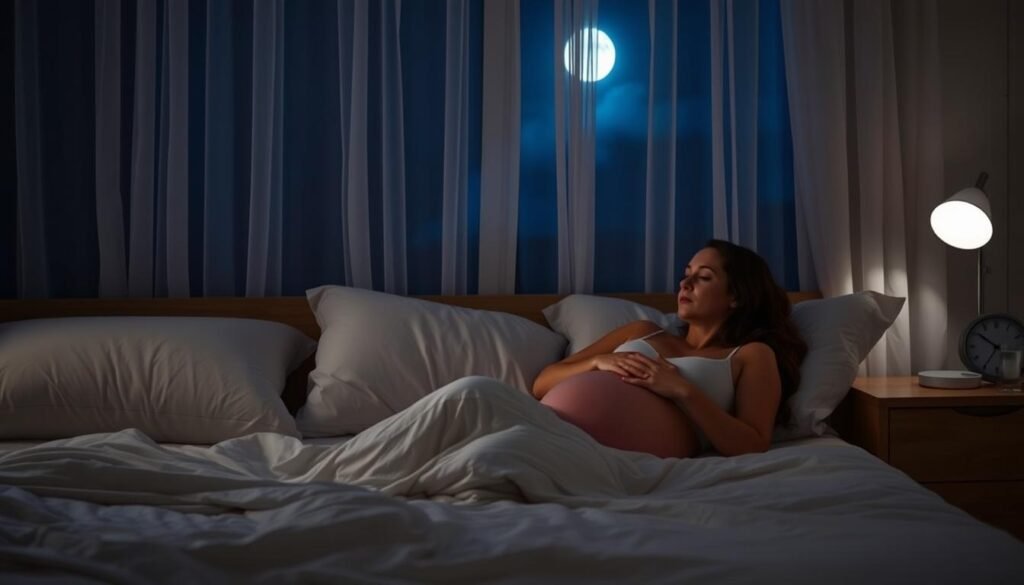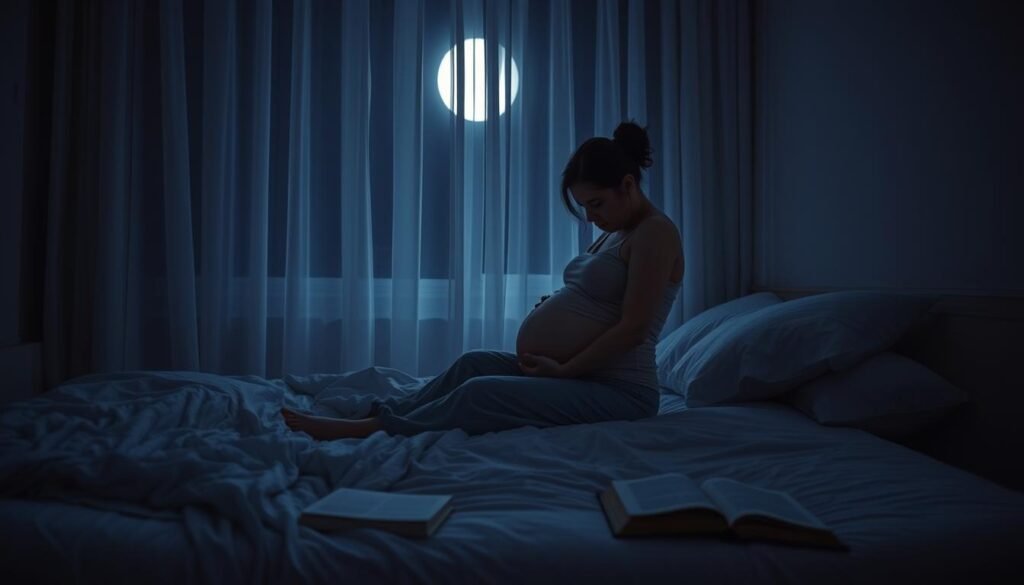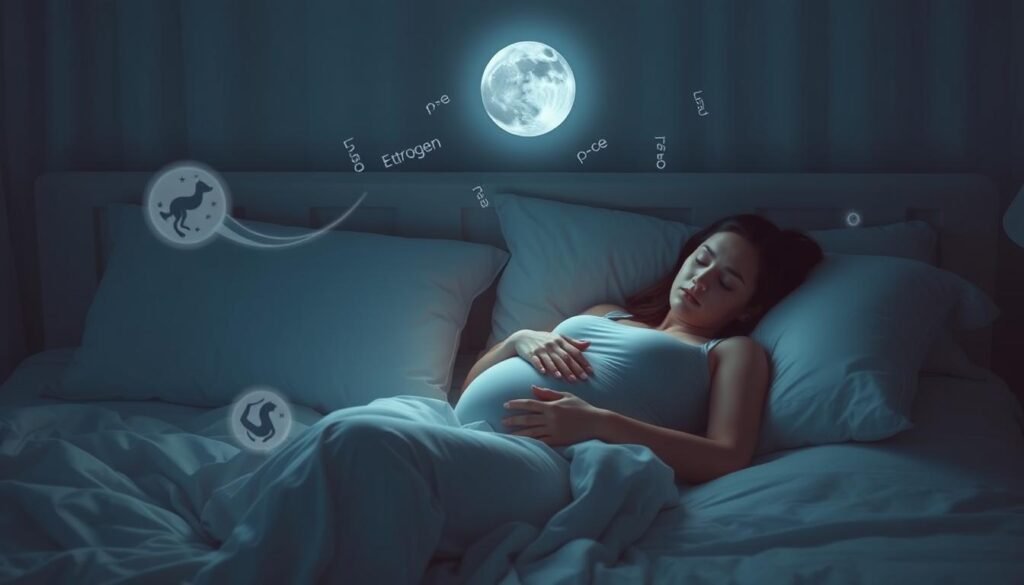It’s quite astonishing, but over 75% of pregnant women face insomnia in the last three months of pregnancy. This widespread issue comes from many sources, making sleep hard to come by as the due date nears. Hormonal shifts, growing discomfort, and increased stress play huge roles in what’s known as third trimester insomnia.
Sleep gets harder to find, leaving expectant moms feeling drained. Knowing the causes of insomnia during this time is vital for the health of both mother and unborn child. Almost every woman reports difficulty sleeping in this stage. Handling these sleep issues early is key to a better pregnancy experience.
Early action to improve sleep quality is crucial. Understanding what causes insomnia and using strategies to deal with it is essential. This might include changing nightly routines or making the sleeping area more comfortable. For tips on managing sleep and stress during this time, check out this helpful guide.
Key Takeaways
- Over 75% of pregnant women experience insomnia in the third trimester.
- Hormonal changes, physical discomfort, and anxiety contribute to sleep issues.
- Addressing sleep disturbances early can promote a healthier pregnancy.
- Nearly every pregnant individual reports challenges with sleep during this period.
- Effective coping strategies can improve sleep quality for mothers-to-be.
- Continued sleep deprivation may lead to complications like gestational diabetes.
- Physical discomfort from baby growth significantly impacts sleep patterns.
Understanding Insomnia During Pregnancy
Insomnia is common in pregnant women, with about 78% affected. It’s caused by many things, like hormone changes and discomfort. Women often find it hard to sleep well in the first and third trimesters. The second trimester tends to be easier, known as the ‘honeymoon phase’.
Hormones, especially higher progesterone levels, mess with sleep during pregnancy. This is really noticeable in the first trimester. By the third trimester, the body is getting ready for birth. That means more anxiety, discomfort, and restless legs, making insomnia worse.
It’s important to tackle pregnancy sleep disorders for the health of mother and baby. Good management can lessen sleep issues. Starting with natural remedies or advice from health experts is a wise move. Knowing about insomnia and its effects can help moms improve their sleep and health.
There are ways to sleep better during pregnancy. Try keeping a regular sleep schedule, making your bedroom better for sleep, and relaxing before bed. Looking into sleep disturbances during pregnancy can also be really helpful.
| Trimester | Insomnia Symptoms | Prevalence |
|---|---|---|
| First | Hormonal changes leading to sleep difficulties | Common |
| Second | Possible relief; still some disturbances | Less affected |
| Third | Increased physical discomfort and anxiety | Nearly every pregnant person reports issues |
What Causes Insomnia in the Third Trimester
The last stretch of pregnancy brings several sleep challenges. Knowing what causes these issues helps moms-to-be tackle sleep better.
During the final months, hormonal changes significantly affect sleep. An uptick in hormones like progesterone boosts fatigue but makes good sleep hard. Moms often feel worn out yet struggle to find peaceful sleep, harming their happiness.
Physical Discomfort from Baby Growth
The baby’s growth interrupts sleep too. Back pain and the difficulty of moving an enlarged body are common. The baby’s weight and other pregnancy discomforts lead to broken sleep, making insomnia worse.
Increased Anxiety and Stress Levels
Emotions run high during this time. Many pregnant women worry about labor and becoming parents. These worries increase stress, making it hard to unwind and sleep. This mental stress adds to the difficulty of getting enough rest.
| Factor | Impact on Sleep |
|---|---|
| Hormonal Changes | Increase in fatigue yet difficulty achieving restful sleep |
| Physical Discomfort | Back pain and baby weight disrupt sleep patterns |
| Anxiety | Heightened stress regarding childbirth and parenting leads to sleep interruptions |
Pregnancy Sleep Disturbances Overview
Pregnancy brings on sleep issues that change a woman’s rest. It’s key to know about these problems and how they impact mothers and their babies. Many pregnant women face sleep troubles later in pregnancy.
Types of Sleep Disturbances in Pregnant Women
More than insomnia disturbs pregnant women’s sleep. They might also experience:
- Snoring
- Sleep apnea
- Restless leg syndrome
- Frequent awakenings due to discomfort
These issues can break a good night’s sleep, especially later in pregnancy. Physical and emotional stresses of becoming a mom play big roles.
Statistics on Third Trimester Insomnia
About 60% of pregnant women report insomnia in the late stages. The toughest sleep challenges come during this time. Worries about labor add to the problem, causing worse sleep quality.
| Reason for Sleep Disturbance | Typical Impact |
|---|---|
| Frequent urination | Interrupted sleep due to needing to get up at night |
| Physical discomfort | Difficulties in finding a comfortable sleeping position |
| Stress and anxiety | Difficulty falling and staying asleep |
| Hormonal changes | Altered sleep patterns and increased restlessness |
Understanding these insights helps pregnant women find solutions for better sleep in the third trimester.
The Role of Frequent Urination at Night
Frequent urination at night is typical during pregnancy, especially late in the game. The expanding uterus presses on the bladder. This increases the need for bathroom visits. Women might start feeling this as soon as the first trimester. For some, it barely registers. Yet, for others, it’s a major sleep disruptor.
How Pregnancy Affects Bladder Control
The body changes a lot during pregnancy, affecting bladder control. The growing uterus puts more pressure on the bladder. This causes more nighttime bathroom trips. Cutting back on evening drinks can help reduce these trips. Research shows about half of pregnant women deal with insomnia, often because of these bathroom visits.
Strategies to Manage Nighttime Bathroom Trips
There are helpful ways to deal with frequent nighttime urination during pregnancy. Here are some tips:
- Try to fully empty the bladder by leaning forward when you go.
- Cut back on diuretics like caffeine, especially in the evening.
- Limit drinks before bed to feel less urge to pee at night.
- A pregnancy pillow can provide extra comfort and support for sleep.
If the problem gets worse or feels off, it’s wise to see a doctor. Testing for urinary infections might be needed. Knowing that sleep quality is key, adopting these methods can help. They make nighttime more comfortable and improve sleep during this important time.

Anxiety and Insomnia in Late Pregnancy
In the late stages of pregnancy, many women feel anxious. This often affects their sleep. About 42.4% of women in a study said they had insomnia in their third trimester. Anxiety about childbirth, becoming a parent, or existing mental health concerns can lead to poor sleep. It’s important to understand how anxiety and sleeplessness are linked in late pregnancy to find solutions.
Impact of Anxiety on Sleep Quality
Anxiety can make it hard for pregnant women to fall asleep. Concerns about labor or how to handle parenting can keep them awake. Anxiety also leads to worse sleep quality. This affects their emotional and physical health. In turn, poor sleep can increase anxiety. Research shows addressing sleep issues in pregnancy can lower the risk of anxiety and obsessive-compulsive symptoms after the baby is born. For more information on sleep problems during pregnancy, visit this link.
Managing Anxiety Symptoms During the Third Trimester
To sleep better in late pregnancy, managing anxiety is key. Cognitive-behavioral therapy, meditation, and deep breathing can help ease anxiety. Having a calming bedtime routine also improves sleep. Pregnant women should try light exercise, eat well, and get advice from healthcare providers. These steps can lead to better sleep and a more comfortable pregnancy.
| Study | Findings |
|---|---|
| 2021 Review | 42.4% reported insomnia during the third trimester |
| 2019 Study | Over half of participants had clinically significant insomnia |
| 2021 Study | Poorer social and emotional development in babies at age 2 |
Sleep Deprivation During Pregnancy
Sleep deprivation during pregnancy is a big challenge for mothers and their babies. Knowing about these effects can help people find ways to sleep better.
Effects of Sleep Deprivation on Mother and Baby
About 60% of pregnant people have trouble sleeping late in pregnancy. This leads to feeling tired, irritable, and having a hard time focusing. Not sleeping enough can cause serious health problems. These include preeclampsia, longer labor, and diabetes during pregnancy.
Lack of sleep can also slow down the baby’s growth and development. Sleep problems like obstructive sleep apnea can make things worse by making it even harder to sleep. Plus, not getting enough sleep is linked to feeling more anxious and depressed. This shows how closely sleep and emotional health are connected.
Long-term Consequences of Insufficient Sleep
Not sleeping enough during pregnancy can have lasting health effects. Pregnant people need 8 to 10 hours of sleep a night. Not getting this can increase the chance of postpartum depression and the need for a C-section. It’s important to talk to a doctor about ways to sleep better. This can include lifestyle changes, therapy, and safe sleep aids.
Good strategies might be having a regular bedtime and making the bedroom soothing. Taking care of sleep issues is key for health now and after the baby is born.

| Aspect | Impact |
|---|---|
| Sleep Duration | Recommended 8-10 hours | Less than 6 hours increases risks |
| Health Risks | Preeclampsia, Gestational Diabetes, Long Labor |
| Emotional Impact | Increased anxiety and risk of postpartum depression |
| Support Techniques | Cognitive Behavioral Therapy, Lifestyle Changes |
Restless Leg Syndrome in Pregnancy
Many pregnant women get Restless Leg Syndrome (RLS) in the third trimester. It causes a need to move the legs because of uncomfortable feelings. This makes it tough to sleep well at night. It’s key to know about RLS during pregnancy because it can mess up sleep and cause other issues.
Understanding Restless Leg Syndrome
About one-third of pregnant women may get RLS, often in the last part of pregnancy. The symptoms can get worse as the baby grows. This is linked to low levels of iron and folate. Keeping up with nutrition during pregnancy helps prevent RLS.
Managing Symptoms of Restless Leg Syndrome
There are ways to ease RLS symptoms:
- Avoiding caffeine and smoking.
- Exercising to boost blood flow.
- Keeping a regular sleep schedule.
- Using heating pads or taking warm baths.
- Adjusting diet, with possible iron and folate supplements.
If these don’t work, some medicines might help. But, be careful because they can affect the baby.
The Link Between RLS and Insomnia
RLS in pregnancy often means insomnia too. The discomfort can wake you up, leading to tiredness and moodiness during the day. Poor sleep can make RLS worse, affecting the mom’s mental health and happiness. Relief often comes after the baby is born. However, managing RLS symptoms during pregnancy is vital.
| Underlying Causes | Symptoms | Treatment Options |
|---|---|---|
| Iron deficiency | Uncomfortable leg sensations | Lifestyle changes, iron supplements |
| Hormonal factors | Intense urge to move legs | Medications (if necessary) |
| Familial history | Nighttime restlessness | Warm baths, leg massage |
Effects of Hormonal Changes on Sleep
Hormonal changes deeply affect sleep during pregnancy, especially in the last trimester. Knowing these changes helps women manage sleep problems well. Increased levels of hormones like progesterone and estrogen are behind various sleep issues, impacting sleep quality.
How Increased Hormones Disrupt Sleep Patterns
The effects of hormonal changes on sleep differ throughout pregnancy. The last trimester brings its own set of challenges. High progesterone levels can make you tired. Yet, they might also lead to sleepless nights and broken sleep cycles. Many women find themselves waking up often at night, a common experience closer to labor. Hormonal changes also cause physical discomforts like leg cramps and heartburn, making it harder to sleep.
Hormones that Influence Sleep in the Third Trimester
Several hormones affect sleep regulation during this time. Here’s how:
- Progesterone: Makes you sleepy during the day but may interrupt sleep at night.
- Estrogen: Messes with body temperature, causing hot flashes and night sweats.
- Oxytocin: Increases during sleep, leading to contractions that disrupt rest.
- Melatonin: Is key for the sleep-wake cycle but gets less effective with these disruptions.
About 78% of women have more sleep problems during pregnancy than at other times, showing the need to understand the effects of hormonal changes on sleep during this key phase. Plus, the best sleep temperature for pregnant women is between 60-67°F (15.5-19.4°C). This can help lessen the hormonal effects.

| Hormone | Impact on Sleep |
|---|---|
| Progesterone | Can cause tiredness and insomnia |
| Estrogen | May lead to hot flashes and night sweats |
| Oxytocin | Increases contractions during sleep |
| Melatonin | Regulates sleep-wake cycles but may be disrupted |
Tips for Improving Sleep in the Third Trimester
Expecting moms often need effective ways to deal with sleeplessness in the late stages of pregnancy. Making small changes in lifestyle and where you sleep can make a big difference. Here are some tips to help you sleep better.
Lifestyle Changes to Enhance Sleep Quality
Changing your daily habits can greatly improve your sleep:
- Try light exercises, like walking or prenatal yoga, to help you relax.
- Use meditation or deep-breathing exercises to lower stress levels.
- Keep a regular sleep schedule to help your body recognize when it’s time to sleep and wake up.
- Strive for at least 8 hours of sleep every night. Take naps during the day if needed.
Sleep Environment Modifications
Making your sleeping area comfy is key to better sleep:
- Use pillows that support your back and legs to reduce discomfort.
- Keep your room dark and quiet to avoid being woken up easily.
- A humidifier might help with nasal congestion, reducing snoring and helping you breathe easier.
- Try sleeping on your left side to improve blood flow to your baby and maybe reduce bathroom trips at night.
When to Seek Professional Help
If you’ve tried these tips but still can’t sleep, it might be time to see a doctor if:
- Insomnia continues after trying lifestyle changes and fixing your sleep space.
- Sleep issues are impacting your daily life or mental health.
- You’re worried about symptoms like leg cramps or restless legs affecting your sleep.
| Tips to Cope with Pregnancy Insomnia | Benefits |
|---|---|
| Engage in light exercises | Reduces anxiety and enhances relaxation |
| Maintain a regular sleep schedule | Reinforces natural sleep patterns |
| Create a comfortable sleep environment | Minimizes disruptions during the night |
| Consult a healthcare provider when needed | Addresses persistent insomnia and related concerns |
Conclusion
Insomnia in the third trimester affects many expectant mothers. Studies reveal that 42.4% experience it. This problem is often due to hormone changes, the baby growing, and stress. Acknowledging these reasons helps pregnant women improve their sleep. Good sleep is key for their health and the baby’s development.
To navigate pregnancy sleep issues, effective strategies are essential. They help establish good sleep habits. These habits make becoming a mother easier. It’s crucial for expectant mothers to see the benefits of tackling insomnia. Good sleep aids fetal growth and eases post-delivery sleep challenges.
Addressing insomnia in the third trimester goes beyond just sleeping well. It empowers women to take charge of their health during an important time. With proper knowledge and support, they can handle this challenging phase better. This lets them fully enjoy becoming mothers.